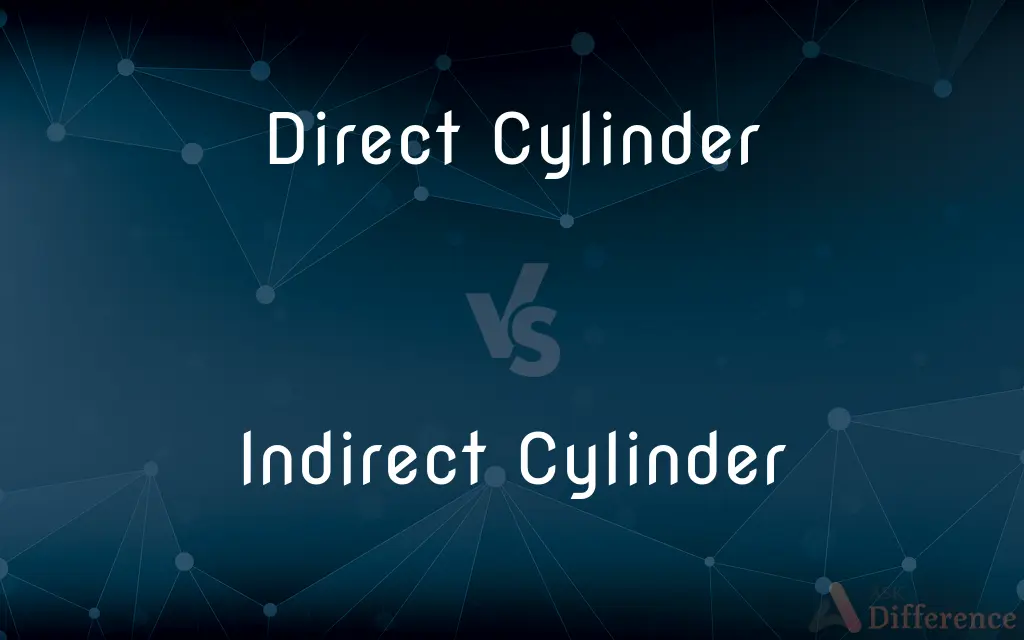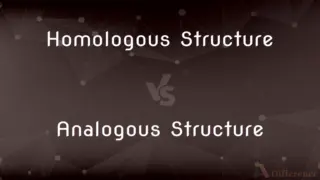Direct Cylinder vs. Indirect Cylinder — What's the Difference?
By Maham Liaqat & Fiza Rafique — Published on September 14, 2024
A direct cylinder heats water using an internal element, such as an immersion heater, whereas an indirect cylinder relies on an external heat source, like a boiler, to heat water through a coil inside the cylinder.

Difference Between Direct Cylinder and Indirect Cylinder
Table of Contents
ADVERTISEMENT
Key Differences
In a direct cylinder, water is heated within the unit itself by one or more electric immersion heaters. These elements are directly immersed in the water, efficiently transferring heat to the water surrounding them. On the other hand, an indirect cylinder uses a coil through which hot water or steam from an external boiler circulates, transferring heat to the water stored in the cylinder without direct contact between the heating source and the domestic water.
The direct cylinder system is often simpler and more straightforward, requiring only an electrical connection to function, making it suitable for homes without a central heating system. Conversely, indirect cylinders are integrated into the home's central heating system, utilizing the heat generated by the boiler, making them more efficient in homes with existing central heating.
Direct cylinders are generally considered easier and less expensive to install, as they do not require connection to a boiler or central heating system. However, indirect cylinders, while potentially more complex and costly to install, can be more energy-efficient, especially in homes that already use a central heating system for space heating.
In terms of maintenance, direct cylinders might require more frequent checks and replacements of the immersion heaters, whereas indirect cylinders may need maintenance related to the boiler and the coil system. However, the indirect system's reliance on a boiler means that if the boiler is efficient and well-maintained, the overall system can be quite effective and cost-efficient.
Direct cylinders can provide hot water even if the central heating is off, making them a good choice for homes in milder climates or for households with less consistent hot water needs. Indirect cylinders, however, are typically more suited to homes in cooler climates or for larger households, where the demand for hot water is higher and more constant, benefiting from the efficiency of using a single heat source for both space and water heating.
ADVERTISEMENT
Comparison Chart
Heating Method
Internal immersion heaters
External heat source via a heat exchanger coil
Installation Complexity
Generally simpler and standalone
Integrated with central heating system
Energy Efficiency
Less efficient, as electricity is used for heating
More efficient, especially with an efficient boiler
Cost
Lower initial installation cost
Higher initial cost due to integration complexities
Maintenance
Frequent checks of immersion heaters
Maintenance of boiler and coil system
Compare with Definitions
Direct Cylinder
Can have multiple immersion heaters for redundancy.
Our direct cylinder's dual elements ensure we always have hot water.
Indirect Cylinder
More energy-efficient in homes with central heating.
Upgrading to an indirect cylinder improved our home's energy efficiency.
Direct Cylinder
A water heating system with internal electric heaters.
The apartment uses a direct cylinder for hot water, making installation simple.
Indirect Cylinder
Heats water via a coil connected to an external boiler.
Our home's indirect cylinder efficiently uses the central heating system for hot water.
Direct Cylinder
Requires electrical connection for operation.
After the power outage, we had to reset the direct cylinder's immersion heater.
Indirect Cylinder
Requires a functioning boiler to operate.
When our boiler failed, we temporarily lost hot water from the indirect cylinder.
Direct Cylinder
Ideal for properties without gas supply.
In our all-electric building, each unit has a direct cylinder for hot water.
Indirect Cylinder
Integrated with the home's central heating.
The indirect cylinder and radiators all tap into the same boiler for heat.
Direct Cylinder
Operates independently of the central heating system.
Even when the heating is off, our direct cylinder provides hot water.
Indirect Cylinder
Can be part of a sealed or open-vented system.
Our plumber recommended a sealed system with an indirect cylinder for safety and efficiency.
Common Curiosities
What maintenance does a direct cylinder need?
It primarily requires checking and possibly replacing the immersion heaters.
Can a direct cylinder work without electricity?
No, a direct cylinder requires electricity to operate its immersion heaters.
Is an indirect cylinder more efficient than a direct one?
Yes, in homes with central heating, an indirect cylinder can be more energy-efficient by utilizing heat from the boiler.
Can an indirect cylinder still provide hot water if the boiler is off?
No, it relies on the boiler for heat, so if the boiler is off, it cannot heat water.
Are direct cylinders suitable for large households?
They can be, but indirect cylinders are often more efficient for larger households with higher hot water demand.
Can I switch from a direct to an indirect cylinder?
Yes, but it requires integration with a central heating system, which can be complex and costly.
What is a direct cylinder?
A direct cylinder is a water heating system with internal electric immersion heaters that heat water directly.
How does an indirect cylinder work?
An indirect cylinder heats water through a coil inside the cylinder, which is heated by an external source like a boiler.
Do direct cylinders take up more space?
Not necessarily; the size depends on the water capacity needed, not the heating method.
What happens if the coil in an indirect cylinder leaks?
A coil leak can contaminate the stored water with boiler chemicals and require immediate repair.
How long does hot water last in an indirect cylinder?
It depends on the cylinder's size and insulation, but generally, it can maintain hot water for several hours.
Which is more expensive to install, a direct or indirect cylinder?
Indirect cylinders can be more expensive to install due to their integration with the central heating system.
What is the lifespan of a direct cylinder?
With proper maintenance, a direct cylinder can last 10-15 years or more.
Can I use solar panels with an indirect cylinder?
Yes, some systems allow solar thermal panels to contribute to heating the water in an indirect cylinder.
Why choose an indirect cylinder over a direct one?
For energy efficiency and integration with central heating, an indirect cylinder is often the preferred choice.
Share Your Discovery

Previous Comparison
Wood Alcohol vs. Grain Alcohol
Next Comparison
Homologous Structure vs. Analogous StructureAuthor Spotlight
Written by
Maham LiaqatCo-written by
Fiza RafiqueFiza Rafique is a skilled content writer at AskDifference.com, where she meticulously refines and enhances written pieces. Drawing from her vast editorial expertise, Fiza ensures clarity, accuracy, and precision in every article. Passionate about language, she continually seeks to elevate the quality of content for readers worldwide.













































